Bivalent Booster Mandate Triggers Debates Across Fordham
Members of the university community express their positions in response to the administration’s decision, with some pushing petitions in support of the mandate and others against
Students sit and wait upward of four hours inside the McShane Center’s Great Hall awaiting their bivalent booster dose on Oct. 31.
November 1, 2022
In accordance with the Centers for Disease Control and Prevention (CDC) and its guidelines, Fordham updated its COVID-19 policies and protocols to mandate that anyone seeking access to campus receive the bivalent booster dose by Nov. 1, according to Marco Valera, vice president for administration and the university’s COVID-19 coordinator. In an email sent on Sept. 26, Valera announced the new vaccination guidelines, which have since sparked reactions across the campus community both for and in opposition of the mandate.
Prior to the announcement in September, the university’s weekly “Five Things” email newsletter, which contained Fordham’s COVID-19 announcements and updates, noted in its April 1 update that “it may be necessary to require a second booster shot for eligible individuals beginning in September 2022.” The updates were released approximately every eight days beginning on Aug. 11, 2020, until the newsletter was discontinued on May 6, 2022.
Community Members Respond to Bivalent Booster Mandate
Fordham’s bivalent booster mandate has inspired petitions both in support of and in opposition to the mandate by faculty members. According to Mark Naison, professor of African American studies and history at Fordham and one of five faculty members who organized a petition in support of the mandate, the petition collected 222 signatures over the 10 days that it was accepting them.
Naison shared that his reasons for supporting the mandate stem directly from his contact with commuter students and residents of the Bronx who are more susceptible to contracting COVID-19 than other areas of New York City. He shared that, on Oct. 17, a faculty group began circulating a petition in support of the booster mandate. It was sent to University President Tania Tetlow, J.D., on Oct. 27 and was mainly composed of faculty signatures across the Lincoln Center, Rose Hill and Westchester campuses.
“The booster requirement is important to protect the health of everyone at Fordham, especially the most vulnerable among us, and people living and working in the areas adjoining our Lincoln Center, Rose Hill, and Westchester campuses,” the petition read.
Fordham Parents Together, a new organization that protested the bivalent booster mandate on Oct. 14, the day of Tetlow’s inauguration, submitted a letter to the university voicing their opposition to the mandate on Oct. 7.
Fordham Parents Together, a new organization that protested the bivalent booster mandate on Oct. 14, the day of Tetlow’s inauguration, submitted a letter to the university voicing their opposition to the mandate on Oct. 7. According to James Mermigis, senior owner and partner of the Mermigis Law Group, Fordham Parents Together has not received a response from the university as of Oct. 20.
Mermigis Law Group, a law firm on Long Island, is threatening to file legal action against Fordham following its bivalent booster mandate, according to the Bronx Times. Mermigis co-authored a letter addressing Tetlow in which he characterized Fordham’s vaccine policy as “coercive” and cited that it is unlawful for the university to mandate the booster since it is currently being distributed under emergency use authorization.
Mermigis and his co-author wrote that they “demand a reply to this letter by close of business day on Monday, October 24,” and stated that they are “preparing to explore all legal options available to protect Fordham students and employees from discrimination or adverse actions based on their decisions regarding whether or not to inject the most recent booster into their bodies.”
The bivalent booster mandate was announced during the fall 2022 semester, which Mermigis described as “a breach of implied contract” to the Bronx Times, since students had already paid their tuition. He encouraged Tetlow to give the letter “serious consideration” in order to otherwise “avoid litigation.”
Robert Dineen, vice president of Public Safety, said that the university is currently in the process of contacting members of the Fordham community who have not uploaded their vaccination status and have not received an exemption for the booster, the deadline for which was Oct. 28, to confirm their compliance with the policy.
Virginia Ungaro, organizer of the Oct. 14 protest and a Fordham Office of Enrollment Services employee, spoke with The Ram about her opposition to the mandate and shared her concerns about the university’s lack of transparency regarding the repercussions for not receiving the booster.
“They are not telling us if you don’t get this, you will be disenrolled,” Ungaro said to The Ram. “I think they’re just purposefully pulling a bait and switch on the students, and parents should be outraged. This is not cheap, it’s an education.”
Robert Dineen, vice president of Public Safety, said that the university is currently in the process of contacting members of the Fordham community who have not uploaded their vaccination status and have not received an exemption for the booster, the deadline for which was Oct. 28, to confirm their compliance with the policy.
“At this time the University is not restricting access or turning people away from campus,” he said.
According to The Ram, approximately 20-30 Fordham students, faculty and staff gathered outside the university’s main gates across from the New York Botanical Garden on Southern Boulevard to protest the bivalent booster mandate at the same time as Tetlow’s inauguration ceremony was taking place.
Nicholas Tampio, a political science professor at Fordham, attended the protest held on Oct. 14 against the bivalent booster mandate and was one of the organizers of the petition that was in opposition to the mandate. The petition read that the group believed “the final decision whether to receive the bivalent booster should be left to the judgment of each individual, in consultation with that individual’s physician and conscience.”
According to The Ram, the petition in opposition to the mandate has received 113 faculty signatures as of Oct. 25.
Bob Howe, associate vice president for communications, said that as an institution, the university is not in a position “to choose among the many COVID-19 studies” and relies on guidance from the CDC to formulate its COVID-19 protocols.
“The University is not reconsidering the vaccine/bivalent booster mandate,” he said. “The Jesuit teaching that runs through everything Fordham does is being people for others.”
Howe did not comment on the potential lawsuit the university is facing, the petitions released in support of and against the booster from faculty groups, or the protest that took place on the day of the president’s inauguration.
Howe added that the vaccine is about protecting the community and cited that multiple news outlets have reported an increase in COVID-19 infections in Europe which, in the past, has foreshadowed trends in the U.S.
“Being fully vaccinated and boosted helps protect students, faculty and staff — some of whom are more vulnerable to COVID-19 because of age or their individual medical histories,” he said.
Howe did not comment on the potential lawsuit the university is facing, the petitions released in support of and against the booster from faculty groups, or the protest that took place on the day of the president’s inauguration.
Jenifer Campbell, dean of students at Lincoln Center, shared that she was aware of the Fordham Parents Together group and heard about a potential lawsuit. She added that she was aware of some complaints from students regarding the booster mandate but that those complaints “were tied to the parents that had been protesting.”
“At this juncture, the university is standing by its right to say this is what we require for individuals to enter the premises, and there is no plan to change that.” Jenifer Campbell, dean of students at Lincoln Center
Campbell said that she stands by the university’s decision to mandate the booster and noted that she “loves the fact that we offer it.”
“At this juncture, the university is standing by its right to say this is what we require for individuals to enter the premises, and there is no plan to change that,” she said.
Students Respond to the Mandate and Share Their Vaccination Experience
Veronica Eulate, Gabelli School of Business at Rose Hill ’25, received her booster dose on Oct. 31 in the Great Hall at the Joseph M. McShane, S.J. Campus Center. She shared that her overall experience was time-consuming and could have been improved if the process was more organized.
“I actually took around four hours, which was very frustrating because they actually ran out of Pfizer vaccines in the middle of it,” she said. “I understand that there was a lot of people coming in, which was something very good, but at the same time I thought they would be more prepared for something like that — especially since the deadline for the booster mandate is coming up soon.”
In response to student complaints about the long lines at the university’s vaccination sites, Campbell said that she believes that the lines are a result of students “waiting until the last minute to take it” and that members of the Fordham community had ample time to secure an appointment for the booster prior to the Nov. 1 deadline.
Eulate expected the wait to be 30-40 minutes and noted that she was late for her class while waiting in line to get the vaccine.
In response to student complaints about the long lines at the university’s vaccination sites, Campbell said that she believes that the lines are a result of students “waiting until the last minute to take it” and that members of the Fordham community had ample time to secure an appointment for the booster prior to the Nov. 1 deadline.
Regarding the mandate itself, Eulate believes that everyone should be vaccinated. She added that she also thinks mandating vaccines in general prevents people from determining whether or not they want to receive the booster, and she is mindful of other people’s frustrations.
“I think that we already had our two doses, we already had the booster, and now do I really have to get a second booster?” she asked.
“It seems like we’re past the pandemic but I think it’s kind of stupid to sit there and say, ‘Oh, well, this doesn’t matter anymore,’ and throw a fist about a COVID vaccine mandate.” Louis DeSalvio, FCLC ’24
Louis DeSalvio, Fordham College at Lincoln Center ’24, received his bivalent booster dose on Oct. 27 at Lincoln Center’s South Lounge located in the Ram Café. DeSalvio did not have an appointment and noted that his overall experience took him a little under an hour. He suggested that the university make greater use of its availability for appointments and mentioned that he was unable to set up an appointment once the times were released.
“I don’t know how other people’s experience was with appointments, but for me it wasn’t very good, and I would have liked people to get in and out of there pretty fast,” he said.
DeSalvio noted that the university’s decision to mandate the bivalent booster was an “interesting choice” but that he was not surprised to see that the policy received backlash. He understands Fordham’s mandate and mentioned that in a city like New York, transmission of COVID-19 is “really, really easy.”
“I think it’s a necessity,” he said. “It seems like we’re past the pandemic but I think it’s kind of stupid to sit there and say, ‘Oh, well, this doesn’t matter anymore,’ and throw a fist about a COVID vaccine mandate.”
Student Body Raises Concerns Over Vaccine Mandate
United Student Government at Rose Hill (USGRH) held its sixth senate meeting of the semester on Oct. 6, at which one of the public concerns raised was regarding the vaccine mandate.
Although Fordham is one of the few institutions to mandate the booster alongside Harvard University, Yale University and Tufts University, the administration believes that others will follow suit, according to Howe.
President of USGRH Santiago Vidal Calvo, Fordham College at Rose Hill (FCRH) ’24, Vice President of FCRH Gaby Simporios, FCRH ’24, Senator Jamie Serruto, FCRH ’24, Senator Keegan Roeder, FCRH ’23, and Senator Sean Power, FCRH ’24, spoke with Keith Eldredge, assistant vice president and dean of student services, about the concern and fielded questions from the student body.
A transcript of the meeting was recorded which included an explanation of why the booster mandate was installed as well as the deadline approaching. During the conversation, an audience member shared that they were speaking on behalf of a large group of students, parents and members of the Fordham community and asked what the university’s response would be if the mandate received a lot of pushback.
Eldredge responded by noting that the CDC is not a regulatory authority that installs mandates but that their guidance is beneficial to the Fordham community. He also emphasized that the university is considerate of their constituents’ concerns.
“We listen to all the feedback, but ultimately those who are in charge of making these decisions are in charge of making these decisions,” Eldredge said at the meeting. “Feedback will be considered, and we will try to make the best decision that we can.”
Although Fordham is one of the few institutions to mandate the booster alongside Harvard University, Yale University and Tufts University, the administration believes that others will follow suit, according to Howe.
“We strongly suspect other institutions will be revisiting their vaccination policies this fall, if they have not done so already,” he said.

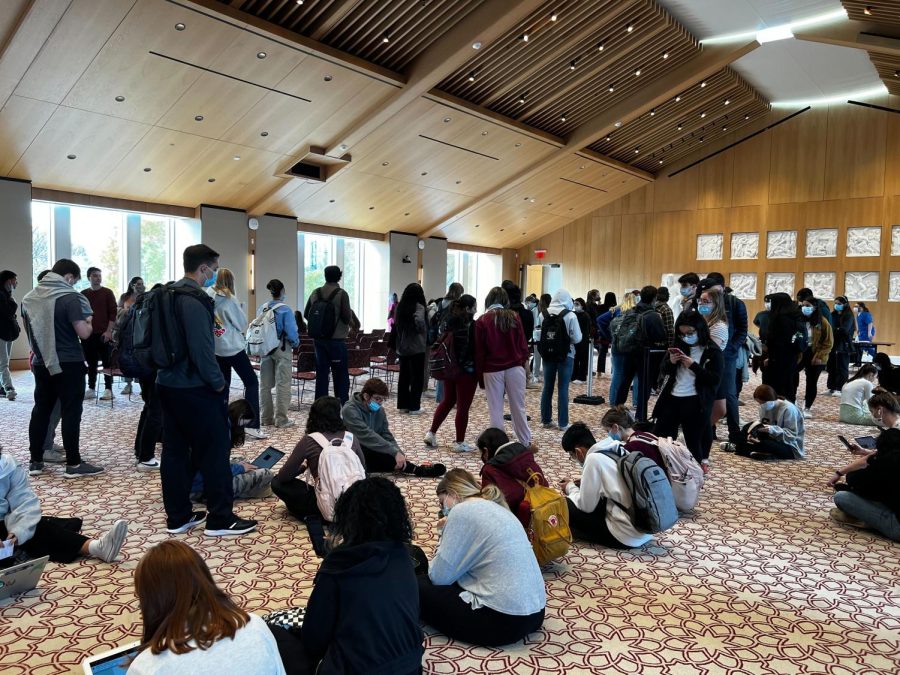
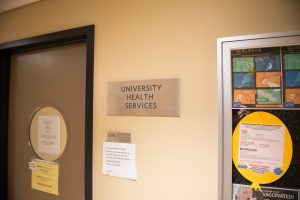
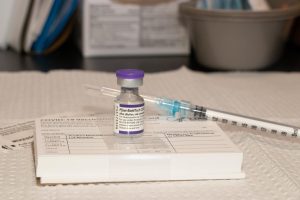
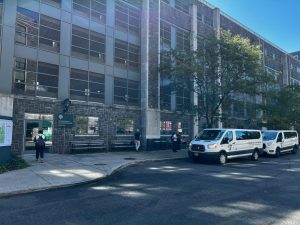
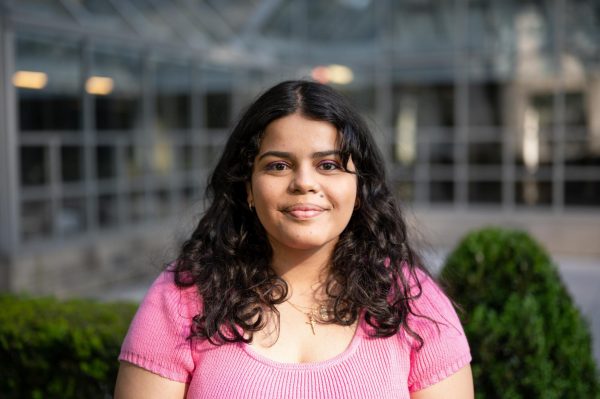









Enrique Lopez • Nov 5, 2022 at 7:12 pm
As a parent, I am in full unquestioned support of the mandate. This is about the health and well-being of all, not the desires of a few. The University’s policy allows for credible exemptions. Whereas there is no guarantee as to outcome, it is a responsible preventive measure.
TomKat Books • Nov 11, 2022 at 1:52 pm
Are you aware that college-age people are in little danger from Covid?
The vaccine may be more dangerous.
Fordham Together • Nov 2, 2022 at 4:32 pm
Thank you for this article. It’s great to see that the Observer’s tone on this topic has become considerably less dismissive since its Oct 14 coverage. Just a few important points and quotes remain missing, so we’ve highlighted them here.
1) This article cites the April 1, 2021 Weekly “Five Things” newsletter as evidence that the school provided notification of the potential for a mandate back in April. In fact, the opposite is true of Fordham’s communications last April. During the Faculty Senate meeting on April 29, Dr. Dennis Jacobs, Provost and Senior Vice President for Academic Affairs, “clarified that the language included in the “Five Things” weekly update is NOT to be interpreted as Fordham having a mandate requiring faculty and students to get a second booster shot. Fordham concurs with CDC language that offers only a “recommendation” of second boosters for those over 50 years of age or immunocompromised.”
The Observer could have noted that the CDC “recommendation” language has not changed since April. As we are not allowed to include links in this reply, please google Fordham Faculty Senate meeting minutes to find Dr. Jacob’s quote in the April 29 minutes.
2) This article states that the petition supporting the mandate collected 222 signatures in 10 days, but neglects to mention that the delivered Fordham Together petition collected 1158 signatures in 10 days. These 1158 signatures comprise approximately 400 parents, 200 students, 200 alumni, 100 faculty/staff, 100 prospective students and parents, and 200 Fordham donors and community members. The petition remains open and as of today has 1290 signatures.
3) This article provides a link to the petition supporting the mandate, but no links to two petitions protesting the mandate. As we are not allowed to include links in this comment, you can join Fordham Together on Facebook to read the letters with links to those two petitions.
4) The article quotes Jenifer Campbell, dean of students at Lincoln Center, as saying that student complaints are “tied to the parents that had been protesting.” Without also quoting even one student confirming Campbell’s implication, quoting her statement demeans Fordham students by implying that they do not think, speak, or act for themselves on their own personal convictions.
5) The article does not include the fact that 241 students signed the Fordham Students petition – despite being taken down by Google for a full two weeks. This is a massive accomplishment given the outright censorship and cancel culture climate in Fordham’s online and offline messaging, including Scarlet Letter phrases like “conspiracy theory” in the Observer’s Oct 14 article.
Fordham’s administration appears to be relying upon 2020 social shaming and long-debunked claims about transmission to stifle free speech by its own students and staff when it could instead be heeding widely accepted CDC statements that these vaccinations cannot – and do not – curtail transmission or infection. These are undeniable facts which entirely negate patronizing claims that mandating the vaccine for Fordham students and staff somehow protects “people living and working in the areas adjoining our campuses,” “the most vulnerable,” and “residents of the Bronx who are more susceptible.”
Is every other university in New York City and New York State unaware of some new data that only Fordham has? Are all those universities callous to the needs of their own communities? Or, are they simply keeping up with 2022 data, unlike Fordham?
Let’s face it. Both Fordham administration and The Observer know full well that there are many students and staff who oppose the mandate but can’t speak out in fear of retribution to their social lives and careers. That retribution is real and everyone knows it.
With a new president who touts open-mindedness and claims to welcome all perspectives, it’s fascinating to observe how only certain perspectives are allowed while others are dismissed, ostracized and actually PUNISHED – even when 99% of all other U.S. universities have adapted to current data and science.
We sincerely appreciate this opportunity to be heard.
Fordham Together
Shelley • Nov 6, 2022 at 5:46 pm
Thank you to the group, Fordham Together, for their thoughtful response and representing the Fordham community that is being suppressed.
Fordham Observer- you should do better journalism than this.
Edward H Delfino • Nov 11, 2022 at 6:47 pm
A very well-written reply, thank you. I am a Fordham alum, and I posted a comment about this topic on their Facebook page, and rather than replying, Fordham, removed my comment and blocked me. Unbelievable.
Dee • Nov 2, 2022 at 11:03 am
weird that it states ‘Co 19 5 things’ has been discontinued since May. I didn’t realize that.
I mean, with all the mania regarding CoohVidd , wouldn’t Fordham want us to stay in the loop? 🙄 🙄